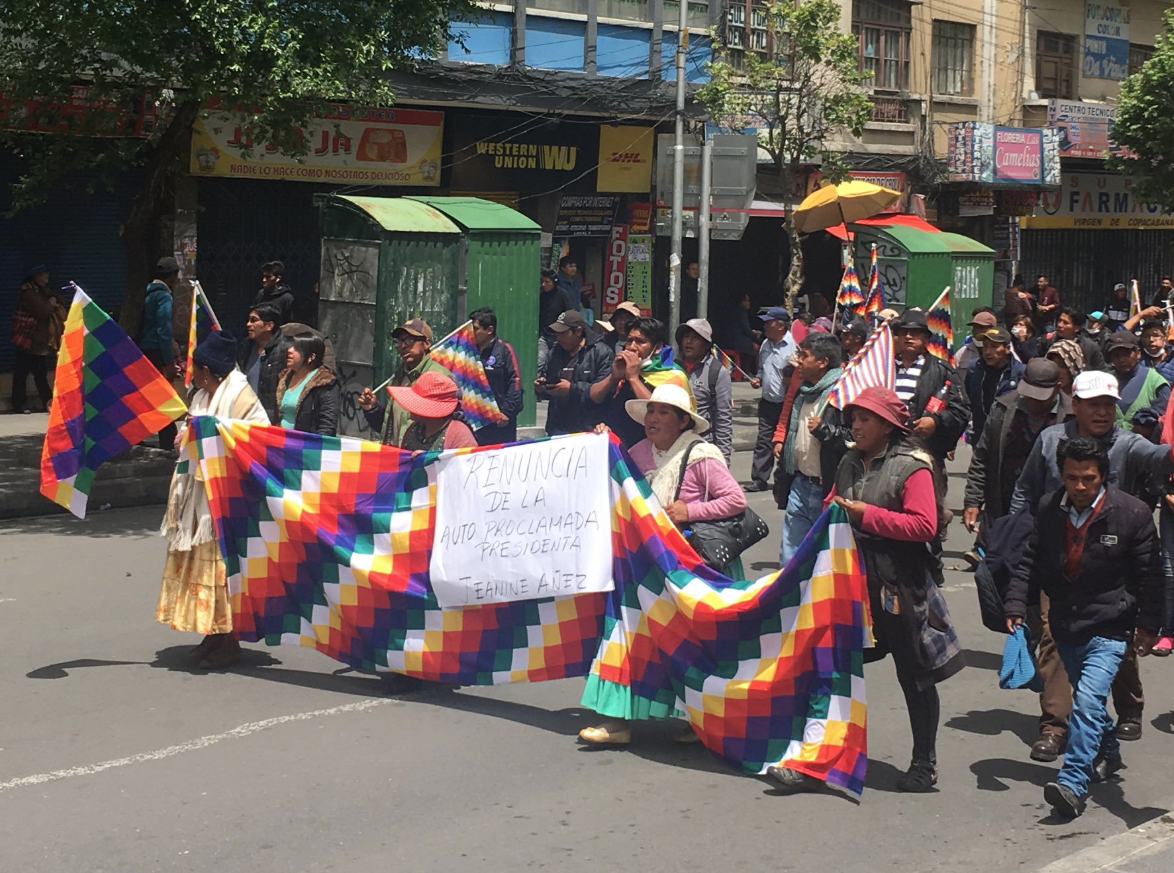The sign reads: "RESIGN self-proclaimed President, Jeanine Añez." Photo: Olivia Arigho-Stiles.
La Paz, Bolivia
Eight are dead and hundreds injured in a week of bloodshed after Bolivia's former President Evo Morales was forced to resign from power last Sunday.
In this slim window of time, an interim unelected president has been installed, anti-coup protesters have been shot dead by the police and hundreds of foreign citizens have been expelled from the country, including over 700 Cuban doctors and Venezuelan diplomats. In total, 24 have died in a month of protest and turmoil.
On Friday 15 November, eight cocaleros (coca growers) were massacred by state security forces as they protested against the new government in Sacaba, Cochabamba. Footage has emerged of bullets being fired by police from helicopters and police firing teargas into a fleeing crowd. A protestor at the scene said. "We ask for justice and that this self-proclaimed president leave. When there was comrade Evo [Morales], there was not a single person dead".
Some newspaper reports cite police who claim the cocaleros were armed with guns and bazookas. This has not been independently verified.
In an extraordinary break with human rights protocol, the government has granted the military immunity from prosecution if they use force in 'legitimate defense', in a decree leaked on social media by the Interamerican Commission on Human Rights (CIDH).
The new interim government assumed power after conservative-religious opposition leader and second vice president of the Senate, Jeanine Añez, appointed herself to the Presidency in a near-empty legislative chamber. Representatives of Morales's party boycotted the session, withholding the quorum necessary to officially accept Morales's resignation and approve the interim president. Añez represents a party that received just 4,24% of the vote.
"The Bible has returned to the palace," Añez declared, brandishing an oversized bible Under the constitution she must call new elections within 90 days.
At the same time, the government has been alluding to the role of foreigners spreading 'sedition', in rhetoric reminiscent of the excesses of the Cold War. The Communications Minister has declared that the government would expel foreign journalists. Arthur Murillo, the new Minister of Government promised to " hunt down" former minister Juan Ramon Quintana, because he is "an animal". He also stated that he plans to arrest legislators and journalists who spread 'sedition'.
Morales' abrupt departure came about after the head of the Bolivian armed forces 'suggested' that he resign following a police mutiny in cities across the country last weekend. This was the culmination of two weeks of mobilization by anti-government protestors, largely steered by ultra-right civic leader Luis Fernando Camacho, who accused the government of fraud in the elections on October 20. It also coincided with the release of the report by the organization of American States which suggested there had been 'manipulation' in the vote count. It should be noted that the allegations of fraud have been contested by US thinktank, the Center for Economic and Policy Research (CEPR). Morales is now in exile in Mexico.
This week has seen massive daily protests against the coup and in support of Morales in La Paz by regional groups of campesinos (land workers), indigenous groups and local associations from El Alto. These invariably end with the police teargassing protestors, including children, in Plaza San Francisco. In the anti-Morales protests which were led by the urban middle classes following the election, teargas was not routinely deployed. A sign at a rally on Thursday in La Paz poignantly captures this double standard: "When the rich march, the policy mutiny. When the poor march, they shoot bullets."
Immediately after the resignation anti-Morales protesters were filmed burning the wiphala, the flag representing Andean indigenous peoples. Footage also circulated of police in the city of Santa Cruz cutting off the wiphala from their uniforms.
The wiphala is a powerful symbol of resistance to the centuries of exploitation, racial violence and social exclusion experienced by indigenous peoples in Bolivia. As Aymara writer Jesus Oscuri writes, the burning of the wiphala combined with the ousting of Morales made many feel as if "the Indian was being expelled from power".
Morales, the first indigenous president of Bolivia was elected in 2005 with his social movement backed party, the Movimiento al Socialismo (MAS). Under his tenure Bolivia has slashed poverty rates, reduced inequality, overseen economic growth while rejecting IMF debt bondage, and nationalized key industries. However his decision to defy a 2016 referendum in which the public voted against him running for a fourth term, then prohibited under the Bolivian constitution, generated deep popular discontent.
These attacks on the wiphala prompted outrage and compelled a wave of marches in La Paz, El Alto and Cochabamba in which protestors demanded 'La wiphala se respeta, carajo" (Respect the wiphala damnit), and called for the resignation of Añez. These protests are also in part, a reaction to the upsurge in racist and gendered violence which accompanied the elections last month. Smeared on the wall outside UMSA, the public university in La Paz, were the words "Indians out of UMSA". A MAS mayor, Patricia Arce Guzman, was attacked by opposition protesters who forcibly cut off her hair, dragged her through the street and covered her in red paint and dirt. The director of radio for the peasants union CSUTCB - an organization allied with Morales which represents rural, usually indigenous workers - was chained to a tree while anti-government protesters ransacked the union's headquarters.
The refrain of anti-Morales protests last month was that under Morales had exceeded his term limits and was a dictator. As the words dictadura (dictatorship) newly graffitied outside the Mercado Lanza building in La Paz attest, now it appears they actually have one.
